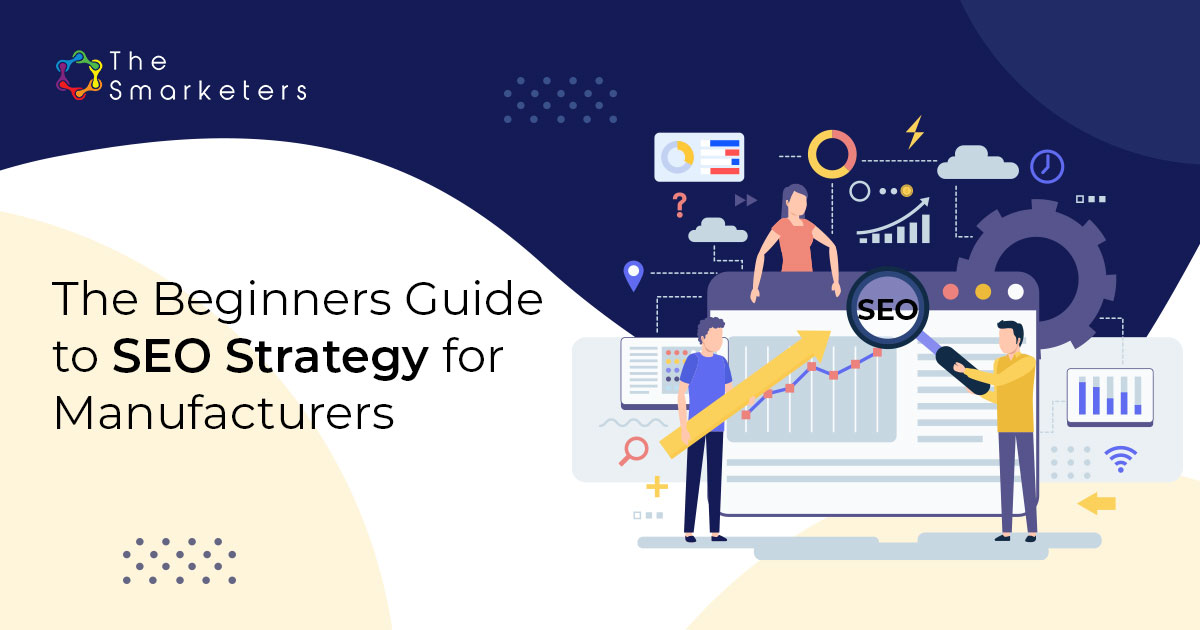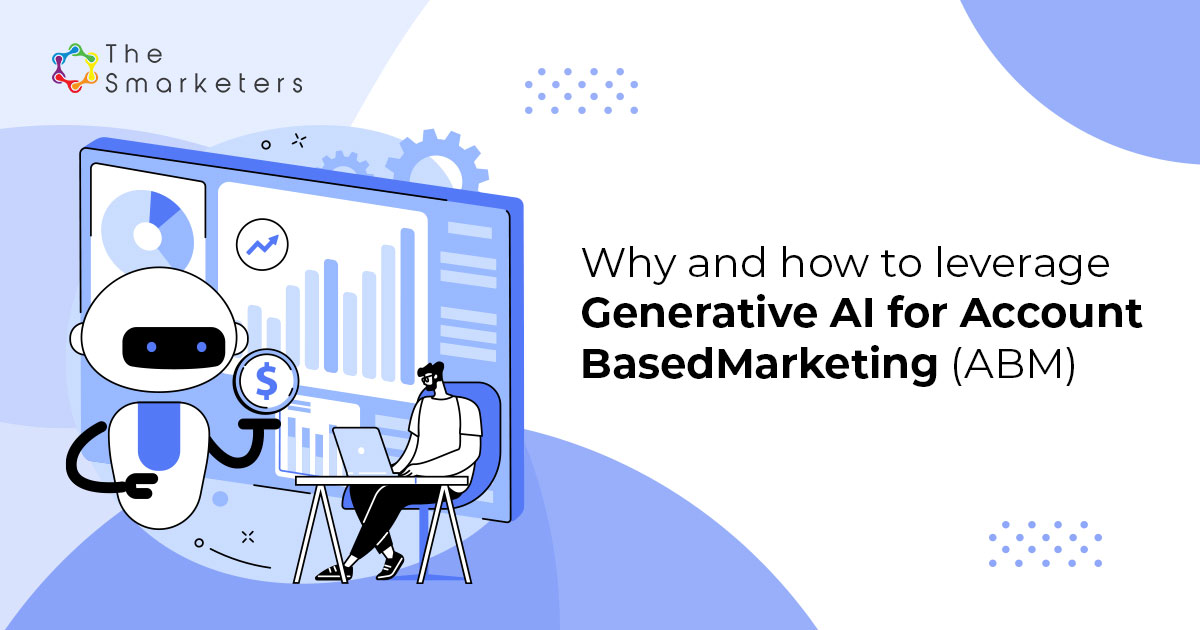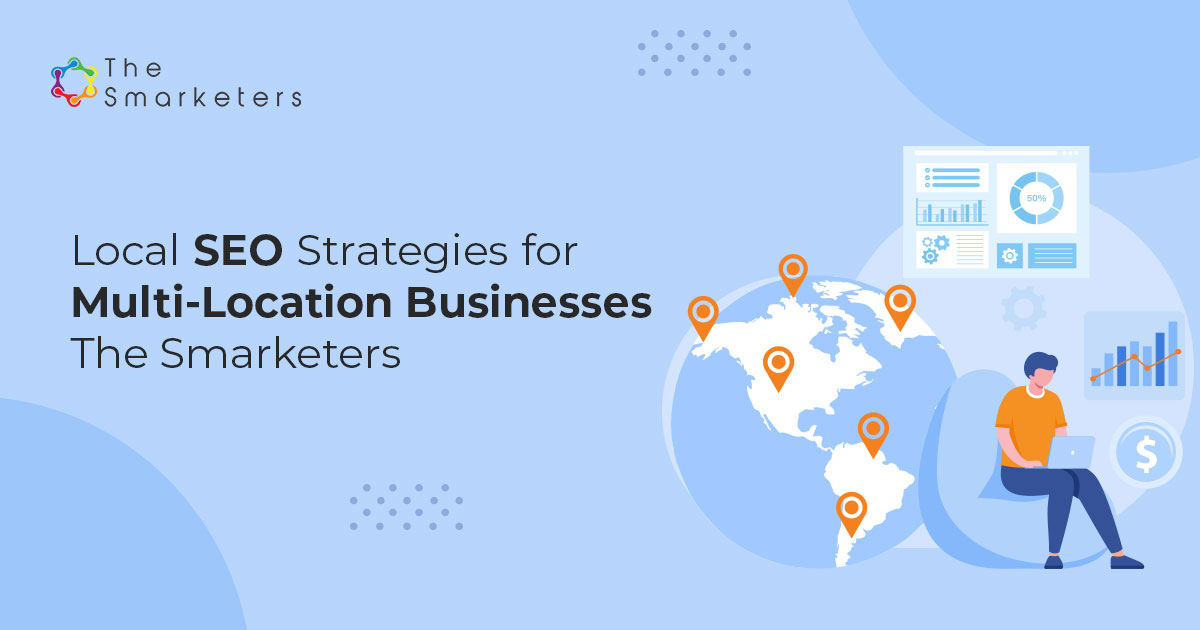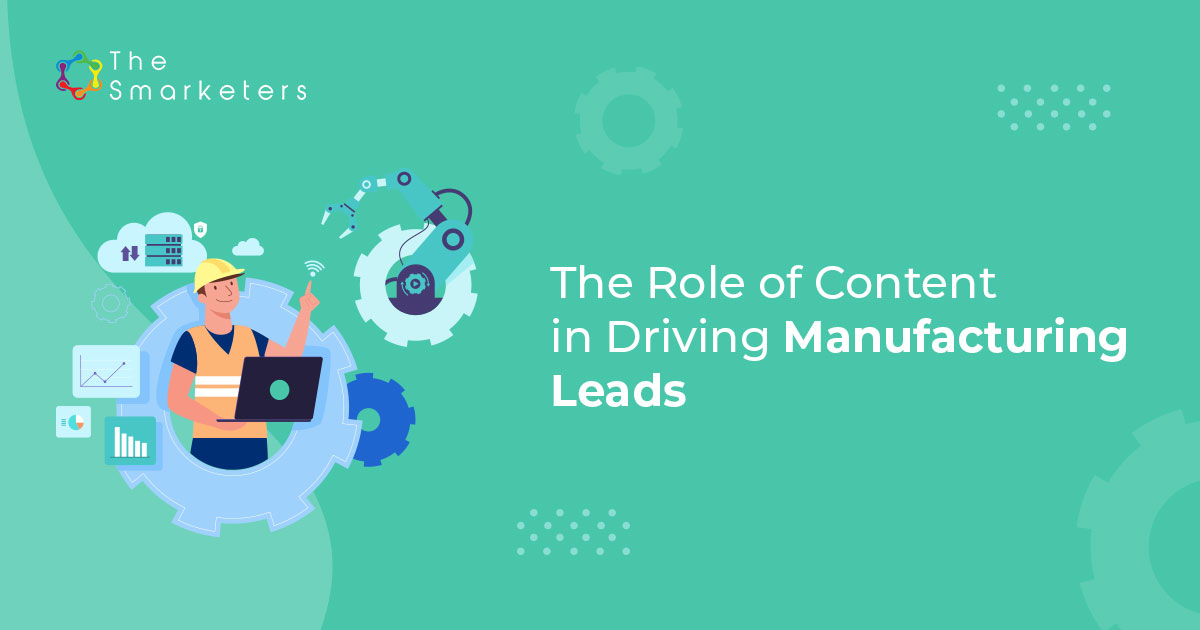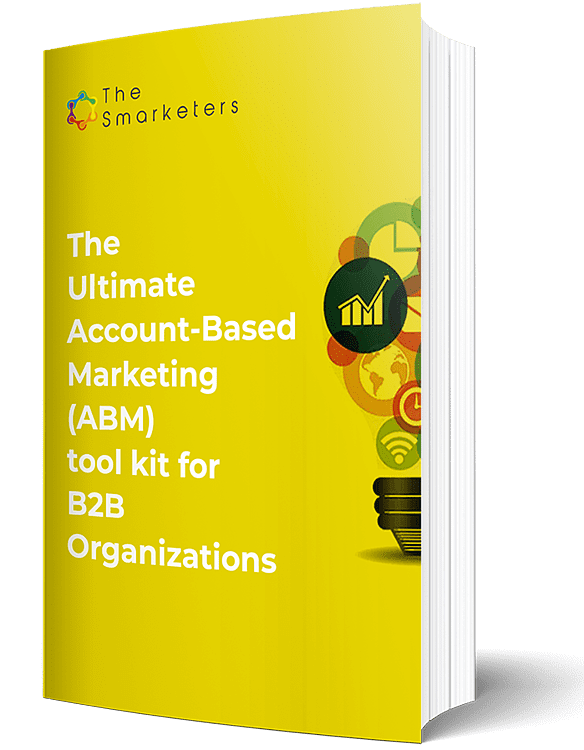Anyone browsing through a search engine like Google or Bing is most tempted to click on the first few links on the SERPs (search engine result pages). In fact, research suggests that 75% of users never scroll past the first page of search results.
That’s because the top three to five links on the first results page are the most credible information sources. But how do these links attain credibility, and why are they high up the ranks?
If you – as a manufacturing company – are asking this question in 2023, it’s all about the proven marketer’s tactic – Search Engine Optimization (SEO) best practices.
Leveraging trending SEO for industrial companies can help them get noticed on SERPs, drive organic traffic to their website, convert inbound leads, and earn higher revenues.
Search Engine Optimization builds on sustainable, time-tested methods. Search engines use advanced algorithms to determine answers to a user’s query and the order in which links appear on SERPs. While the algorithms keep changing, the core SEO tricks and strategies remain the same. You can stay on top of the search engine algorithm game only with SEO-optimized quality and meaningful content.
Can SEO play an enabling role in B2B marketing?
According to Gartner research, while making purchase decisions about new products in the market, B2B buyers only spend 17% of their time meeting potential suppliers – they spend nearly 27% of their time on independent online research.
Here, SEO plays a pivotal role. When buyers scourge the web for product information, they are most likely to come across vendor websites delivering unique and quality content. By aligning your content with top SEO tactics, you can attract inbound traffic, engage them, and potentially convert them into buyers.
SEO for manufacturing companies
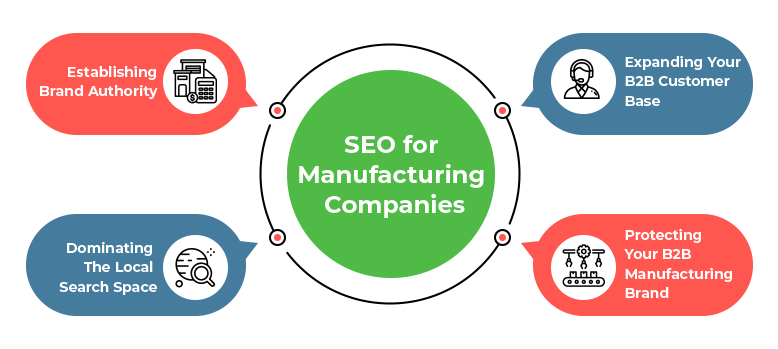
Traditionally, manufacturing companies relied on a bulk of conventional B2B marketing techniques like “big green books,” directories, direct mail, PR, events like seminars, and word-of-mouth to acquire new customers.
However, things escalated fast in the Internet era. Conventional customer acquisition practices made way for digital strategies, including SEO, PPC, SEM, content marketing, email marketing, etc. Modern customers rely on the Internet for product search and information.
A manufacturing company’s customers are primarily other businesses looking for complex products that aid production and entail significant investment. By creating unique content and successfully ranking high for thought leadership searches, SEO aids qualified lead generation for manufacturers and facilitates higher sales and revenue.
For example, blogging – one of the most authentic ways of generating fresh content – and SEO give websites 434% more indexed pages and 97% more indexed links. Manufacturing firms can definitely gain more traction through information-rich content on their solutions.
HubSpot’s 2022 State of Inbound Marketing Trends report states that 83% of marketers believe creating higher quality content periodically is more effective than endlessly churning bulk content.
Usually, the initial researchers looking for B2B manufacturing products online are a few of many stakeholders in the company having the final say on purchase decisions. The trick is to create unique content for decision-makers on different levels. Each content piece should relay information tailored to various buyers within a single account – a successful ABM trick. Of course, SEO is a core part of the content journey here.
However, creating unique content isn’t the absolute end. Search engines crawl websites and consider a lot of factors before ranking. B2B manufacturing SEO also leverages the following key components to be successful:
- User experience: User experience (UX) encompasses features of website design that help users navigate your brand’s web page seamlessly, find what they need, and contact you.
- Backlinks: An increasing number of websites, newsletters, and social media pages refer to or link to your website, making you a trusted industry authority in your niche.
- Page Authority: The relevance of your website to specific industrial and manufacturing products and services. Research shows that 73% of B2B manufacturing buyers use websites as a critical factor in submitting Requests for Information (RFIs).
SEO for manufacturing companies offers several benefits that power both ABM and inbound marketing campaigns, reeling in more and more prospects.
Let’s take a look.
- Establishing brand authority
Higher search engine rankings and visibility are sure-shot methods of establishing brand authority and crafting your brand as a thought leader in the B2B arena.
B2B manufacturing companies can group leads as accounts (ABM for manufacturing) and continuously churn out unique, high-quality content catering to different audience groups. It helps strengthen the brand reputation, allowing B2B customers to find you in search results.
- Expanding your B2B customer base
SEO helps generate B2B leads to your manufacturing brand’s website, helping expand your customer base. Moreover, as your brand slowly dominates the B2B organic search space, the demand for your solutions among end users increases inevitably.
This pushes distributors and other intermediaries to stock your product, making them new leads in your sales pipeline.
- Dominating the local search space
Manufacturing companies focused on generating high-quality leads for specific geographic locations and regions must use local SEO to rank high for keywords like “X near me” and “where to buy.” It makes the brand easily accessible to local B2B buyers.
- Protecting your B2B manufacturing brand
When your web pages rank high on search engine results for search queries, it eliminates counterfeits, brand abusers, and copycats stealing brand information from the picture. Essentially, SEO protects your manufacturing brand’s integrity and reputation and sparks conversations around your product.
SEO for Manufacturing: Best Practices
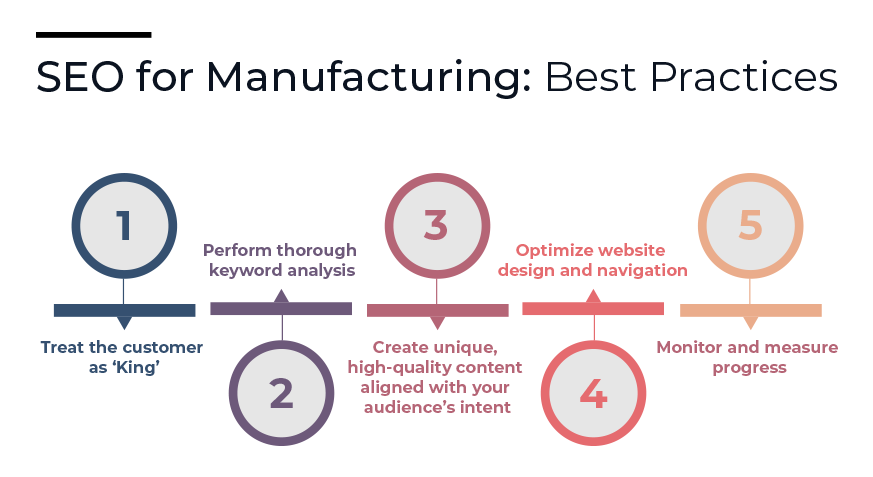
Lead generation using B2B manufacturing SEO isn’t about “quick fixes,” “trial and error,” or “cheat tricks.” It is a systematic process that requires adopting best practices gradually refined over time to help manufacturing industries attract the right prospects, secure quality leads, and boost ROI.
Here are some of the best practices for SEO for manufacturing companies.
- Treat the customer as ‘King’
SEO for manufacturers isn’t merely about generating traffic and pushing leads into the pipeline. It’s about prioritizing quality engagement and qualified conversions to fill your sales pipeline with SQLs.
This requires understanding your customer better and finding a way for them to reach you.
Determine what you want to convey through your content. Understand what people are searching for online. Question your sales team about the customer queries, concerns, and objections they frequently face. Then address those and other frequently asked questions (FAQs) through your digital content.
- Perform thorough keyword analysis
Getting to the top five results on Google is a priority for B2B manufacturing companies. After identifying what customers are looking for, the next step would be to research similar customer queries, list the top keywords/phrases, and Google them to check what pages rank the best.
Your searches should center around your manufacturing processes, products, what customers are searching for, and typical industry-specific topics.
First, categorize your searches as informational or transactional. A typical information search would be: “How does IoT enhance manufacturing operations?”
Conversely, a transactional keyword conveys a desire for the product. For example, “Buy Product A.”
For every keyword:
- Understand search volume in terms of how many people perform this search monthly.
- Determine the difficulty in ranking high for the keyword.
- State a keyword’s relevance in relation to the product your B2B brand manufactures.
Remember that basic, everyday industrial descriptors will not suffice to attract the right audience to your product. Instead, try specific, long-tail keywords like “Car Spare Parts in Hyderabad” that target specific industries or audiences.
Moreover, you can leverage insights from your organic website visits to determine pay-per-click (PPC) advertising keywords, adjust bids, and increase ROI from paid initiatives. PPC advertising pays the advertiser every time a user clicks the ad link.
- Create unique, high-quality content aligned with your audience’s intent
With knowledge of the most relevant and frequently popping-up keywords, map out your content strategy. Precise, informational content is highly appreciated in the manufacturing sector. Avoid unnecessary fluff and stuffing of keywords – keep your content organic and easy to follow.
Google uses its famous E-A-T (Expert, Authoritativeness, Trustworthiness) standard to determine which content to serve its users. So, ensure that whatever you write resonates with the audience and can answer their questions comprehensively.
Your website content should:
- Delve deeper into your manufactured products.
- Provide helpful tips on choosing the right products for your needs.
- Explain related manufacturing processes
- Include detailed guides, ebooks, case studies, industry-specific reports, and product and competitor analysis
- Show how-to videos on product usage
Create clear, concise, and attention-grabbing meta titles using primary keywords. Ensure your meta description acts as a teaser to the web page’s content while including the primary and a few secondary keywords.
- Optimize website design and navigation
Optimizing your website is crucial for enhancing UX. Visitors must be able to easily navigate your website to get the information or solution they need.
- Monitor your crawl depth. Ensure your product pages are not too far from your website’s home page. It should take a maximum of four clicks to navigate from the front page to the product change your prospects intend to visit.
- Always review your redirects to ensure Google retains your old URLs. Make sure you permanently redirect a URL after some time. Review all 404 errors stemming from broken links. A website with too many broken links is hard to crawl, giving Google the impression that it’s under construction or poorly maintained.
- Google’s latest mobile-first indexing approach uses your website’s mobile version to index pages. So, make sure your web pages have a mobile-responsive design, load sufficiently quickly on mobile networks, and have clickable, mobile-optimized menus.
- Monitor and measure progress
Setting up your SEO practices for success isn’t complete without monitoring the progress of your efforts. Since the primary aim of SEO for manufacturing companies is to generate maximum inbound leads, it will be excellent to focus on vital KPIs:
- SERP impressions and click-through rate: The number of people who click through to your website after seeing it on the SERP.
- Engagement rate: It measures the value of your organic content by analyzing how long people stay on your site or how many product pages they visit.
- Conversion rate: It denotes the percentage of the target audience acting upon a conversion goal, including signing up for emailers, filling out a contact form, or downloading gated content (ebooks, whitepapers, etc.).
- Closing rate: It denotes the percentage of leads that eventually become your customers.
Final Thoughts!
Manufacturing companies must embrace the latest marketing trends to connect with the new-age digitally savvy B2B buyers. It helps capture a big chunk of the market.
Inbound lead generation for manufacturing entails leveraging digital marketing channels to find and convert valuable leads. Thus, SEO is vital to strengthening your inbound and ABM campaigns by making your manufacturing brand visible to potential buyers.
Want to get SEO-ready? The Smarketers are here to help!
We at The Smarketers work with SMBs and Fortune 500 companies to deliver best-in-the-industry ABM and Inbound Marketing services.
We provide SEO services across industries ranging from IT/SaaS and telecom to healthcare and manufacturing.
- Our highly-skilled SEO experts ensure every piece of content on your website is fully optimized with SEO best practices.
- We also help your business achieve greater visibility by embedding on-page and off-page SEO best practices to get your website to rank higher on search engines.
Get in touch with our SEO experts to know more.



